Sunday & The Eucharist
Why Sunday?
Why Sunday?
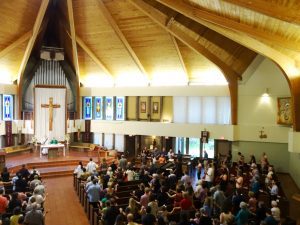 Catholics go to Church on Sundays for many reasons, most of them very good ones. For some Catholics, Sunday is the day of obligation to “go to Church” to pray, listen to the sermon from the priest, and go to communion to keep in a “state of grace”. For other Catholics, Sunday is the day to go to church to “connect” with the community and get re-energized for the week with a sense of “connection” with God and spiritual values. There are also other Catholics who see Sunday as a habit, a routine that they cannot let go of even when they don’t want to do it. In some circles this is called “good Catholic guilt.”
Catholics go to Church on Sundays for many reasons, most of them very good ones. For some Catholics, Sunday is the day of obligation to “go to Church” to pray, listen to the sermon from the priest, and go to communion to keep in a “state of grace”. For other Catholics, Sunday is the day to go to church to “connect” with the community and get re-energized for the week with a sense of “connection” with God and spiritual values. There are also other Catholics who see Sunday as a habit, a routine that they cannot let go of even when they don’t want to do it. In some circles this is called “good Catholic guilt.”
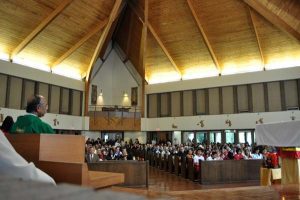 Regardless of the specific “Catholic group” we fit in, the truth is that Sunday has been engraved in the hearts, the minds, and the spirit of every Christian person on earth since the time of Jesus Christ’s passion, death, and resurrection. The primary reason why Christians are obligated to observe Sunday, is not just because it has been mandated by any law of a church, but because it has been mandated by the experience of the Lord’s Resurrection on the first day of the week (Sunday), and the interpretation of this experience from the early Christian times that has been passed on to us and preserved today. Sunday is the “Day of Resurrection”. Sunday (“day of the sun” for pagans), is considered for Christians as the day when the “light of the world is raised, the son of justice is revealed“ (CCC #1166).
Regardless of the specific “Catholic group” we fit in, the truth is that Sunday has been engraved in the hearts, the minds, and the spirit of every Christian person on earth since the time of Jesus Christ’s passion, death, and resurrection. The primary reason why Christians are obligated to observe Sunday, is not just because it has been mandated by any law of a church, but because it has been mandated by the experience of the Lord’s Resurrection on the first day of the week (Sunday), and the interpretation of this experience from the early Christian times that has been passed on to us and preserved today. Sunday is the “Day of Resurrection”. Sunday (“day of the sun” for pagans), is considered for Christians as the day when the “light of the world is raised, the son of justice is revealed“ (CCC #1166).
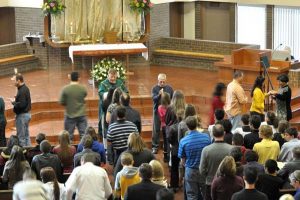 For Catholics, at the center and heart of the Sunday observance, is the celebration of the Holy Eucharist: Sacrifice, Memorial, and Meal as our proclamation of the death and resurrection of Christ (Paschal Mystery). What this Eucharist is about, why we do it, and how we do it, has been passed on to us from its Jewish times where it was instituted, and admirably survived throughout the development of our Christian story and experience. Today, after three millenniums of tradition, the Catholic Church clearly affirms the action of the Eucharist as still central to our faith, our identity, and our mission.
For Catholics, at the center and heart of the Sunday observance, is the celebration of the Holy Eucharist: Sacrifice, Memorial, and Meal as our proclamation of the death and resurrection of Christ (Paschal Mystery). What this Eucharist is about, why we do it, and how we do it, has been passed on to us from its Jewish times where it was instituted, and admirably survived throughout the development of our Christian story and experience. Today, after three millenniums of tradition, the Catholic Church clearly affirms the action of the Eucharist as still central to our faith, our identity, and our mission.
What happens on Sunday?
What happens at Sunday Mass?
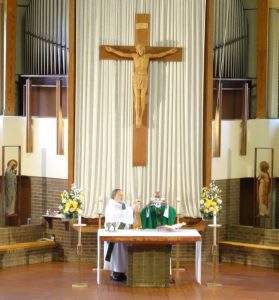 The Holy Eucharist was instituted in the context of a Jewish meal, and as such, the central element has been from its beginning the Jewish prayer at meals. This prayer follows the traditional form and structure of all Jewish prayers (Berakah). It is specifically a prayer of thanksgiving. Eucharist means “thanksgiving”. Like all Jewish prayers, this prayer is addressed to God, and is a prayer of praise and thanksgiving to God for his fruits and works: of creation,protection, and sanctification. This prayer evolved, for Catholics, into what we know today as The Eucharist Prayer of the Mass. It has preserved its basic form and structure, but it has changed some of its content to include the mighty works of God, through his Son Jesus Christ, by the power of the Holy Spirit. Without this Eucharistic Prayer of thanksgiving there is no Mass, no Eucharist, no consecration, no sacrifice.
The Holy Eucharist was instituted in the context of a Jewish meal, and as such, the central element has been from its beginning the Jewish prayer at meals. This prayer follows the traditional form and structure of all Jewish prayers (Berakah). It is specifically a prayer of thanksgiving. Eucharist means “thanksgiving”. Like all Jewish prayers, this prayer is addressed to God, and is a prayer of praise and thanksgiving to God for his fruits and works: of creation,protection, and sanctification. This prayer evolved, for Catholics, into what we know today as The Eucharist Prayer of the Mass. It has preserved its basic form and structure, but it has changed some of its content to include the mighty works of God, through his Son Jesus Christ, by the power of the Holy Spirit. Without this Eucharistic Prayer of thanksgiving there is no Mass, no Eucharist, no consecration, no sacrifice.
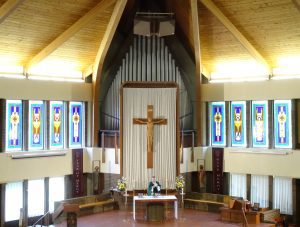 It is during this Prayer that the Holy Spirit is called over the bread and wine that have been presented and offered to God the Father, by the faithful baptized, and are transformed into the Body and Blood of our Lord, Jesus Christ. It is during this Prayer that we hear the words used by Jesus at the time he instituted the Eucharist at the Last Supper with his disciples: “This is my Body… This is my Blood…”. Sunday after Sunday, and at every Eucharistic celebration during the week, these words are narrated during the Eucharistic Prayer by the priest giving us one of the main reasons to give thanks and praise to God: the gift of his Son, who gave his Body and shed his Blood in the cross for our salvation. Thus, the greatest gift of God’s love unfolds in our presence, and makes our prayer of thanksgiving our response of gratitude and praise to God, the Almighty.
It is during this Prayer that the Holy Spirit is called over the bread and wine that have been presented and offered to God the Father, by the faithful baptized, and are transformed into the Body and Blood of our Lord, Jesus Christ. It is during this Prayer that we hear the words used by Jesus at the time he instituted the Eucharist at the Last Supper with his disciples: “This is my Body… This is my Blood…”. Sunday after Sunday, and at every Eucharistic celebration during the week, these words are narrated during the Eucharistic Prayer by the priest giving us one of the main reasons to give thanks and praise to God: the gift of his Son, who gave his Body and shed his Blood in the cross for our salvation. Thus, the greatest gift of God’s love unfolds in our presence, and makes our prayer of thanksgiving our response of gratitude and praise to God, the Almighty.
The Constitution on Sacred Liturgy defines the Eucharistic Liturgy as an action of Jesus Christ and his church praising God and giving thanks: “the liturgy is the exercise of the priestly office of Jesus Christ… with his Mystical Body (Head & Members) performing full and public worship…” (CSL #7-14). In essence, when we come to Mass (Eucharistic Liturgy), we come to encounter and engage God, through the person of Jesus Christ, and we are able to do this by the power of the Holy Spirit!
Therefore, the central person at the Eucharist is our Trinitarian GOD, to whom we give praise and thanksgiving. This is the reason why we are at Mass: because we are members of the Body of Christ (by baptism), and whenever we come together to pray, Christ is at prayer. This is so important to our faith and tradition, that the Church teaches us that the celebration of the Eucharist Liturgy is a sacred action surpassing all others. It is the source and summit of the whole activity and mission of the Church. (CSL #7-14)
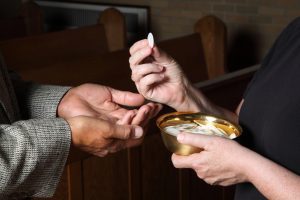 But, this does not end there. The Church also teaches us that this great prayer of thanksgiving performed by Jesus Christ (Body and Members) demands, for its integrity, that all the faithful (meaning the “baptized”), participate fully, consciously, and actively (CSL #14). It makes no sense that only “the Head” of this Body would be engaged in the act of worship, however, it will require that we have something to thank and praise God for. It is a sense of profound gratitude to God for creation, for his redemption in Jesus Christ, and for his gift of salvation through the Paschal Mystery, that motivates and moves us to respond and be fully engaged in singing God’s praises and offering the sacrifice of praise: the essence and nature of the Eucharistic liturgy. By the same token, if we can’t recognize a reason to be grateful to God, we may not find a good reason or motivation to fully participate!
But, this does not end there. The Church also teaches us that this great prayer of thanksgiving performed by Jesus Christ (Body and Members) demands, for its integrity, that all the faithful (meaning the “baptized”), participate fully, consciously, and actively (CSL #14). It makes no sense that only “the Head” of this Body would be engaged in the act of worship, however, it will require that we have something to thank and praise God for. It is a sense of profound gratitude to God for creation, for his redemption in Jesus Christ, and for his gift of salvation through the Paschal Mystery, that motivates and moves us to respond and be fully engaged in singing God’s praises and offering the sacrifice of praise: the essence and nature of the Eucharistic liturgy. By the same token, if we can’t recognize a reason to be grateful to God, we may not find a good reason or motivation to fully participate!
What do we do at Mass?
What do we do at Mass?
Three things happen during this magnificent act of worship and thanksgiving, and we do them all: we offer a (1) sacrifice to God, we do the (2) memorial (remembering) of Jesus Christ’s death and resurrection , and partake on the sacred (3) meal, in obedience to his mandate “do this in memory of me” (Luke 22:19) Because of these three actions that take place during the Eucharistic celebration, we refer to the Eucharist being as a Sacrifice, a Memorial, and a Meal.
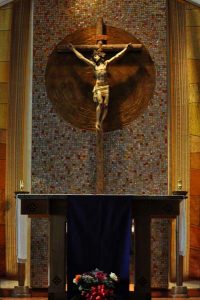 SACRIFICE (OFFERING)
SACRIFICE (OFFERING)
The Eucharist is not a historical re-enactment of the sacrifice of Calvary, it re-presents (makes present) the one sacrifice of Christ in the cross: the work of redemption is carried out over and over throughout all generations (CCC #1364) (LG #3[6]) This time, sacrifice includes the Church’s offering: our lives and work are united to the Christ’s total offering of himself, and our lives are reinterpreted with renewed meaning and value.
Memorial (Remembering)
In the Jewish and Scriptural tradition, the memorial is not an act of remembering or recollection of past events. In the liturgical act, these events become present and real (e.g. In Passover, the Exodus events of the past are made present – so they are not forgotten and believers conform their lives to them) (CCC #1363). In this way, Jesus gives a new meaning to the Jewish act of “remembering” (Memorial). The Eucharist, as memorial of Jesus’s death and resurrection (Christ’s Passover), makes the sacrifice on the cross ever present today and through generations so we may conform our lives to Christ’s life of self-giving. What we do every Sunday at Mass, is not our own act or event for our own sake, it is an act done in the name of Jesus, in memory of Him. Like Him, we do it for the glory of God and for the sanctification of the whole world.
Meal (Partaking of the Sacred Banquet)
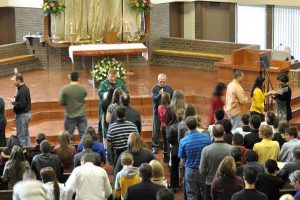 The sacrifice offered as a memorial of Jesus Christ’s saving event, is consummated and fulfilled in the eating and drinking of the Body and Blood of Christ. This mealwas mandated by the Lord at the Last Supper: “Do this in remembrance of me.” (1 Cor. 11:23-26) For Catholics, the centrality of the real presence of Christ in the bread and wine we eat and drink, transformed by the power of the Holy Spirit into the Body and Blood of Christ, is essential to our faith and to our mission as Church. We eat and we drink together as a Body of believers, and, as we share in the holy and sacred meal, we affirm and proclaim our bonds of unity in Christ and in our common mission as his disciples (CCC #1339-1342).
The sacrifice offered as a memorial of Jesus Christ’s saving event, is consummated and fulfilled in the eating and drinking of the Body and Blood of Christ. This mealwas mandated by the Lord at the Last Supper: “Do this in remembrance of me.” (1 Cor. 11:23-26) For Catholics, the centrality of the real presence of Christ in the bread and wine we eat and drink, transformed by the power of the Holy Spirit into the Body and Blood of Christ, is essential to our faith and to our mission as Church. We eat and we drink together as a Body of believers, and, as we share in the holy and sacred meal, we affirm and proclaim our bonds of unity in Christ and in our common mission as his disciples (CCC #1339-1342).
Holy Thursday
Eucharist and the Gospel of John (Holy Thursday)
We are all familiar with the accounts of the institution of the Eucharist that we find in the Synoptic Gospels and in the Letter of St. Paul to the Corinthians (Mk 14:12-25, Mt 26:17-29, Luke 22:7-20, 1Cor.11:23-26). We know the classic account of the moment in which “…they were at supper, Jesus took bread…” However, Holy Mother Church, in its wisdom throughout the millenniums, when it celebrates the institution of the Eucharist at the Easter Triduum on Holy Thursday, the Gospel chosen to bring the meaning and focus of this holy sacrament into the lives of the faithful, is taken from the Gospel of John. In this gospel, when we are expecting that Jesus …takes bread and giving thanks, breaks it a
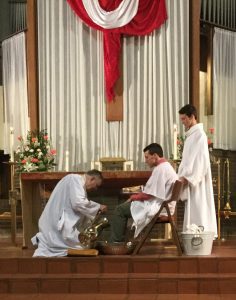
nd gives it to his disciples saying: “This is my Body”, He surprises us with a different unexpected action: …he takes a basin and a towel and begins to wash his disciples feet.” At the end, he tells them “As I have done, so you must do – love one another as I have loved you.” (John 13: 1-15)
On Holy Thursday, when we profoundly reflect on this great Eucharistic Mystery, we are reminded that the heart of the Eucharist is love, the sacrificial love of Christ who calls us to service, giving of our lives, like He did, and shedding our blood, like He did, for the good of others. Eucharist without love and service for others, becomes an act of self-idolatry, a contradiction to Jesus’ sacrifice on the cross.
Coming Soon
Coming Soon
- Why the Liturgy… the rituals, the symbols, the formality…?
- Scripture readings at Mass: The Word of the Lord
- Parts of the Mass: what they mean and why we have them…
- Why do we decorate the Church and how do we do it?
- Why a “communion service” is not a Mass or a celebration of the Eucharist?
- Real Presence…magic or mystery?
- Eucharistic Devotion, Exposition, & Adoration… why, when, where, and how?
- How do we prepare and “plan” for the Liturgy for Sunday?
- And much more…
